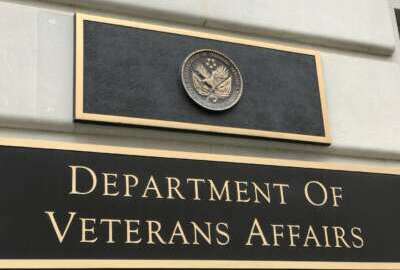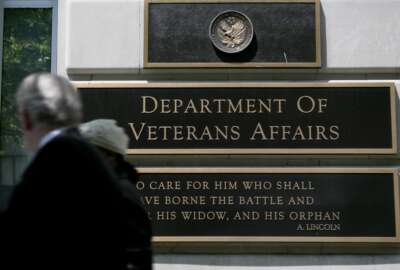Veterans Affairs takes on a new scam: pension poaching
Deliberately bad advice can help a veteran get pension benefits out of the Department of Veterans Affairs. Sometimes the advisers take the money for themselves.
Best listening experience is on Chrome, Firefox or Safari. Subscribe to Federal Drive’s daily audio interviews on Apple Podcasts or PodcastOne.
Deliberately bad advice can help a veteran get pension benefits out of the Department of Veterans Affairs. Sometimes the advisers take the money for themselves. Eventually the veteran will be forced to pay it all back. It’s called pension poaching and it’s a growing problem. For how the department is trying to stop it, the Federal Drive with Tom Temin turned to the VA’s Chief Financial Officer Charles Tapp.
Interview transcript:
Tom Temin: Mr. Tapp, good to have you back.
Charles Tapp: Thanks again for having me on this morning. It’s always a pleasure to spend some time with you and certainly speaking about important topics for our veterans.
Tom Temin: All right, so pension poaching, how do these schemes actually work here?
Charles Tapp: Well, as you know, fraud is increasing on a global scale, and it’s changing the way businesses and individuals have to protect themselves. And pension poaching is pretty much a financial scam that targets veterans, survivors and their families who are potentially eligible for VA benefits. This popular scam occurs when unethical advisers tried to artificially qualify VA pensionneers or potential pensionneers to get pensions by hiding their money via trust, or hiding their money in annuities. And the unfortunate thing is, once VA reviews those applications or does revaluations on an annual basis, and we determined that a pensioneer was not actually eligible, unfortunately, sometimes those veterans have to repay those funds.
Tom Temin: Right, almost similar to Medicaid, you have a look back period also. In this case, it’s three years?
Charles Tapp: Absolutely. So generally speaking, when we qualify someone, we do a look back of three years, and then average obviously on an annual basis when we revisit the financial condition of a pensioner, we’re also looking back at their federal tax information to make sure they maintain their qualification for this important benefit.
Tom Temin: Well, unless the pension payments can get diverted to the adviser, what is the incentive for these advisers to mislead the veterans in that manner?
Charles Tapp: Well unfortunately, when they’re working with veterans, what they do is they charge a fee up front for setting up an annuity or setting up a trust, and those fees again goes to those unscrupulous actors. The other thing that can happen also in a pension poaching situation is where you may have family members who asked the beneficiaries to deposit their benefits into their account versus the veteran account. Those are two scenarios, certainly where our veterans and sometimes our elderly veterans are being taken advantage of.
Tom Temin: Are there any clues? I mean, what methodology do you have to be able to suspect when someone is applying in this manner that this doesn’t look right?
Charles Tapp: Well, unfortunately, there’s not a lot of clues on the front end. Usually we find them in arrears once we’re doing our investigation or inquiries. So the unfortunate thing is that veterans aren’t aware, and they’re not educated on the front end. Sometimes the challenge is we’re catching them after the unfortunate act has already occurred.
Tom Temin: Because if someone has an application in for a pension, but the funds are requested not in their name to go somewhere else, would that maybe trigger an automatic investigation?
Charles Tapp: Well a lot of time with the bank accounts and the information that we receive, we get a routing number and a bank account number submitted by the veteran. So generally the veteran is in charge of what information they provide us. So again, if they’ve been convinced by a family member or a third party to deposit their benefits in their accounts. Unfortunately, that’s a choice that the veterans have made that sometimes that may result in them not receiving the benefits that they truly have earned.
Tom Temin: Is there a way to say pause that application so that you can get a message, maybe do this routinely for everybody and say, we see you’re applying for pension benefits, just keep these rules in mind, and then proceed or something in that way, kind of a pause in the middle?
Charles Tapp: So what we do is actually we try to educate our veterans as well as our veterans service organizations and their accredited powers of attorney on what to look out for. We always share with our veterans never fill out forms and pre-sign them before information is input so that you absolutely know what you’re signing. We also emphasize the fact that you should work with an accredited VSO and those accredited VSOs you can absolutely find out who those are using the VA.gov site, and then our search engine typing in accredited representatives. And we will provide a list of VSOs and attorneys that have been vetted through the VA. We also make sure that folks understand that they don’t allow their benefits to be deposited in someone else’s account to make sure it comes to your account. And obviously, if you need to make transfers, or there’s financial transactions that you maintain the control of that as a veteran. Because it’s very important, again, for your overall financial safety.
Tom Temin: We’re speaking with Charles Tapp, he’s chief financial officer of the Veterans Affairs Department. And any idea how much pension poaching costs VA every year?
Charles Tapp: So right now, we have close to 300,000 veterans and survivors who are in receipt of some type of pension. And right now the number of fraud cases is less than 1%, and the amount of money that’s defrauded is no less than $100,000. But we found just like when we process claims that every veteran is more than just a claim number. They’re an individual. So for each veteran or survivor that’s defrauded, you take that very personally. So while the numbers aren’t gaudy for those veterans who are defrauded, it means the world to them. So we want to make sure that we’re taking all the actions that we can to protect those who have served our country and serve them well.
Tom Temin: And you want to point out too also to veterans that if they are caught, even unwittingly misled by some of these scammers, nevertheless, they’re the ones that have to pay back the pension money they’ve received.
Charles Tapp: Yes, unfortunately, again, when benefits are filed they’re filed certainly in the name of the veteran or the survivor. So if there’s an issue in terms of eligibility, unfortunately, that does come back to the beneficiary. And they would be the ones who would be held responsible in terms of returning funding back to the federal government in instances where they were not deemed to be eligible.
Tom Temin: And just to reiterate, there is a way that someone can vet a service provider or an advice giver, through third party means?
Charles Tapp: Absolutely. So again, if they go to VA.gov, and in our search engine at the top right hand corner of the website, if you type in accredited representative, we can absolutely confirm that those folks are accredited. Or if they have challenges in working with our website, you can always call the national call center at 1-800-827-1000. And you can certainly ask those same questions. And we can certainly walk veterans through that process to make sure they are certainly working with someone who’s accredited, and someone, again who’s been vetted, through the VA’s Office of General Counsel.
Tom Temin: All right well we’ll help you get the word out here through this very broadcast. And while we have you, just a couple of CFO questions: How are you doing with the compressed fiscal year, which is about half of the normal length of the fiscal year? How are things going and that must put special pressures on the CFO and the accounting staff, just to make sure everything stays kosher in that compressed period?
Charles Tapp: Yeah, no thanks for that question. No, the secretary has been very clear about the importance of receiving a full-year budget, and we are so grateful for the partnership and support from Congress and the president for ensuring that we did get a ’22 budget. And while the timetable is somewhat truncated, we were postured and ready to move forward. So we could actually move forward and spend responsibly in our responsibility so that we could continue to deliver benefits and services to veterans. So again, while the schedule is short, we’ve got our sleeves rolled up, and we’re postured to make good fiscal choices on behalf of veterans and those that we serve.
Tom Temin: And what kind of preparations do you need to make in general for a new fiscal year coming, especially in this case, the president has proposed a pretty good budget increase for VA for 2023. Nowhere near enacted yet, let alone funds dispersed, but should that potential come to pass, how do you get ready for that?
Charles Tapp: Each year, what we do is we’re making sure that we’re in constant communication with our stakeholders. We’re engaged with discussions with our veterans service organizations, members of Congress and veterans themselves to understand what are their expectations of VA and VBA, specifically, and as we looked at the 23 budget, our key focus point was making sure, number one, we had enough resources, and we could continue to process the three Gulf War presumptives the Secretary approved last summer, and that’s asthma, rhinitis and sinusitis. So we made sure we had an FTE to continue to process those claims both timely and of high quality. Number two, our budget request is also focused on automation. We recognize that as we continue to have new presumptives, that automation may provide us another tool so that we can process claims more quickly. So again, that veterans don’t have to wait longer. So we’re very focused in those particular areas. And then last, but certainly not least, we also have some additional FTE that we’ve requested. Because again, as we continue to educate veterans more through our TAP [Transition Assistance Program] and through other educational mediums, we get more claims, and we don’t want veterans waiting longer to get the benefits that they’ve earned and deserve. So we asked for additional FTEs so we can process those both timely and accurately. So again, our veterans receive their benefits and services without having an extended wait.
Tom Temin: Charles Tapp is chief financial officer of the Veterans Affairs Department. As always, thanks so much.
Charles Tapp: Thank you for having me again, it’s always a pleasure.
Copyright © 2025 Federal News Network. All rights reserved. This website is not intended for users located within the European Economic Area.
Tom Temin is host of the Federal Drive and has been providing insight on federal technology and management issues for more than 30 years.
Follow @tteminWFED






